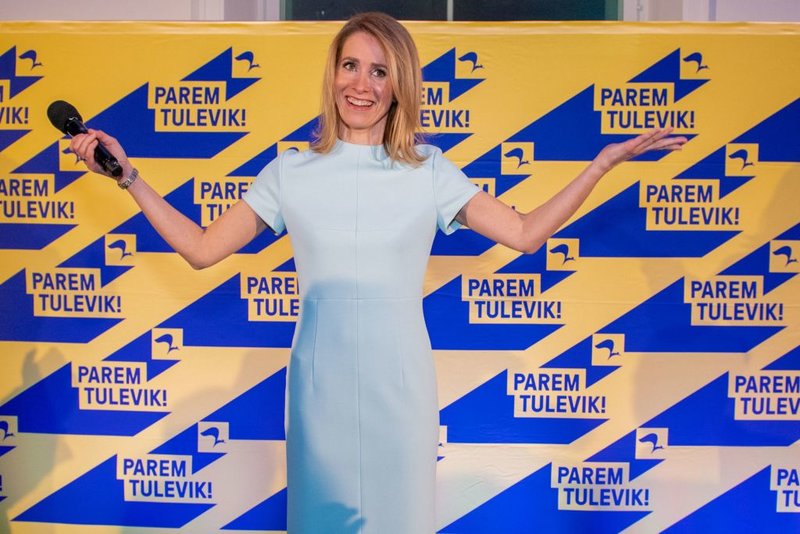执政党意外落败,数字领域先锋爱沙尼亚有望迎来首位女总理

|
上周日在位于巴尔干半岛的爱沙尼亚议会选举中,中间偏右翼政党改革党赢得29.4%的选票。若能成功组建联合政府,改革党党首卡娅·卡拉斯将成为爱沙尼亚历史上第一位女总理。 此次大选中,爱沙尼亚执政党中间党支持率排名第二,得票23.1%,极右翼的保守人民党获得17.8%的选票,得票为上次选举的两倍。根据此前的民调,中间偏左的中间党本有望获胜,却被拥有亲商平台的改革党力压一头。改革党和中间党均倾向欧盟,自1991年爱沙尼亚从苏联独立以来,两党一直轮流执政。 卡娅·卡拉斯现年41岁,是一名律师,专攻数字领域的案件。她曾任欧洲议会的议员。现在改革党的任务是跟其他党派磋商组成联合政府。卡娅的父亲西姆·卡拉斯曾任爱沙尼亚第14任总理,也曾担任欧盟委员会委员。克尔斯季·卡柳莱德是爱沙尼亚第一位女总统,2016年上任,不过总统一职只具象征意义,并没有多少实权。 |
In last Sunday’s parliamentary election in Estonia, the center-right Reform party won 29.4% of the vote, setting up its leader Kaja Kallas to become the first female prime minister of the Baltic country, so long as she can form a coalition government. Estonia’s ruling Centre party took second place with 23.1%, and the far-right Estonian Conservative People’s Party took 17.8% of the vote, double its last showing. The center-left Centre party had been expected to win based on polling, but the Reform party, which has a pro-business platform, pulled ahead. The Reform and Centre parties, both pro-EU, have alternated in power since Estonia’s independence from the Soviet Union in 1991. Kallas, a 41-year-old lawyer and a former member of the EU Parliament who specialized on digital issues, and the Reform party now must negotiate with other parties to create a government coalition. Her father, Siim Kallas, was the 14th Estonian prime minister and was an EU commissioner. Estonia’s first female president, Kersti Kaljulaid, has been in office since 2016, though the role is largely ceremonial. |

|
爱沙尼亚是个弹丸小国,但在进军数字领域方面极为激进。其地理位置夹在俄罗斯和拉脱维亚中间,仅有130万人口。借助积极的互联网经济思维,爱沙尼亚已经成为全球电子政务领域的佼佼者。2000年,爱沙尼亚成为全球首个宣称上网属于基本民权的国家。同年通过法律,认定数字签名与手写签名具有相同合法的地位。已被微软收购的即时通讯软件Skype就在爱沙尼亚问世。总部设在伦敦的转账汇款服务商TransferWise也在爱沙尼亚创立。爱沙尼亚人从2005年起便可以在网上参与选举投票。英国广播公司(BBC)报道称,上周日的大选期间,爱沙尼亚全国88.1万合格选民有将近四分之一都在网上投票,税务、公共支出和欧盟成员国身份是选民最关心的问题。 卡拉斯竞选时承诺,将采取减税和下调失业保险保费等措施,目标是创造更多就业。赢得大选后几小时内,她又承诺考虑联合其他四大政党中的三个党派,排除了与极右翼保守人民党合作的可能,称“不会考虑”。(财富中文网) 译者:Pessy 审校:夏林 |
Estonia is a little country with a big digital footprint. Nestled next to Russia and Latvia with 1.3 million residents, Estonia‘s progressive thinking about the Internet economy has made it a leader in e-government. In 2000, it became the first country in the world to declare Internet access a basic human right; that same year it passed a law giving digital signatures equal weight to handwritten ones. Skype, now owned by Microsoft, was created in Estonia. And money service TransferWise was founded by Estonians based in London. Estonians have been able to vote online since 2005. The BBC reports nearly a quarter of Estonia’s 881,000 eligible voters used e-voting in last Sunday’s election, in which issues like taxes, public spending, and EU membership were top of mind. On the campaign trail, Kallas promised to cut taxes and unemployment insurance premiums, with the aim of creating jobs. In the hours since winning the election, she’s vowed to consider allying with three of Estonia’s four other parties; she’s ruled out working with the far-right Conservative People’s party, calling it “not a choice for us.” |













